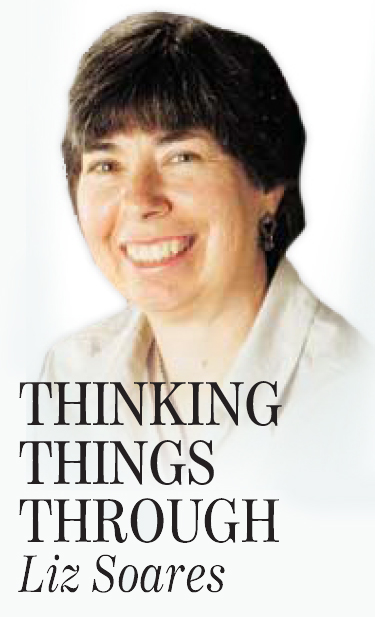Last week in America was alternately frightening, horrifying and sorrowful. I was grateful to have something to look forward to Monday afternoon: making book spine poetry with students from Syria and Iraq.
I’m a school librarian here in Augusta, and this is one of my favorite activities. Students find books with interesting titles and then stack them to make poems. I take pictures of the creations, the students write them down, and then we share aloud. For fun, we respond to each reading by clicking our fingers, like the beatniks did at their poetry gatherings in the 1950s.
I am always amazed by the beautiful poetry students create. It ranges from dark to funny to ethereal. As a practical bonus, students often discover books they want to read as they explore the stacks.
Monday’s session, I expected, would follow along the same lines. Except for last week. And all the hate and vitriol that have been infecting our culture for the last few years. I didn’t think the angry rhetoric aimed at immigrants could get any worse, but it has, with the president sending troops to the southern border and threatening to end birthright citizenship.
As I have heard in the public square of the news media several times in the last few days, “Words matter.” As a writer and a librarian, I know that all too well. So I welcomed this chance for students to make their words matter. I looked forward to hearing what they had to say.
The first few minutes of making book spine poetry involves students standing around and feeling confused. How can we possibly find the right titles to tell the story of what we are feeling and thinking? These students faced the added challenge of making poetry in their second (or maybe even third) language.
To begin, a student has to pick up a book. It may not be the right book, but the act of holding the volume starts the process. One boy did so, and proudly showed me “Why We Came to the City.” It would become the last line of his poem, “City of Life.”
I guess if I ever cease to be amazed at what happens next, I will have to proclaim myself jaded and burned out and skulk off into the sunset. Students start finding books, for themselves and for their classmates. They begin building their poems, often consulting with their friends. The excitement is palpable.
Some of the students wanted books with specific words in the title: Iraq, bees, wrestling. I helped one find a book about Germany. He then spotted the book “Hitler Youth,” and asked me about it. I briefed him on the Nazi organization for young men; he took that book also.
It turned out that the boy who sought the wrestling book actually wanted to learn more about the sport. I love it when that happens.
Soon it was time to return to the tables with our poetry stacks. (I always make one, too.) I photographed the poems, not paying close attention to them yet. Still, some of the book titles jumped out at me. There was “The Worst Year Ever,” and “Buried Heart” and “My Family Divided.” Perhaps the most jarring was “The Keeper of the Isis Light.” This is a 1980 science fiction novel in which Isis is a planet. I’d never seen it before and can’t imagine how the student found it. But it certainly had a place in her poem, which began with “The word is murder” and ended with “Peace like a river.”
The students, their teacher told me, were about to read the novel “Number the Stars,” by Lois Lowry, a Newbery Award-winning author who happens to live in Maine. The book centers on the Danish resistance movement during World War II. One student, aware of the murders in Pittsburgh last Saturday, made a poem he called, simply, “The War:” Blood for blood/Germany/Hitler Youth/Warriors/World War II/Blood will tell.
His teacher said this boy “wanted to make his poem about all the hate that is so hard to run from — for Jews and Muslims.”
On Nov. 8 and 9, 1938, Nazis rampaged through Germany, torching synagogues and Jewish businesses, and killing about 100 Jews.
Last Saturday, in America, a raging anti-Semite shot up a synagogue, killing 11 worshipers. There is no way for right-minded people to understand this.
We must use our voices to speak against hate. These students, who came from war-torn countries to one deeply divided by bitterness and fear, spoke loudly and clearly through their poetry.
Their words matter, and I am listening.
Liz Soares welcomes e-mail at lizzie621@icloud.com
Send questions/comments to the editors.



Comments are no longer available on this story